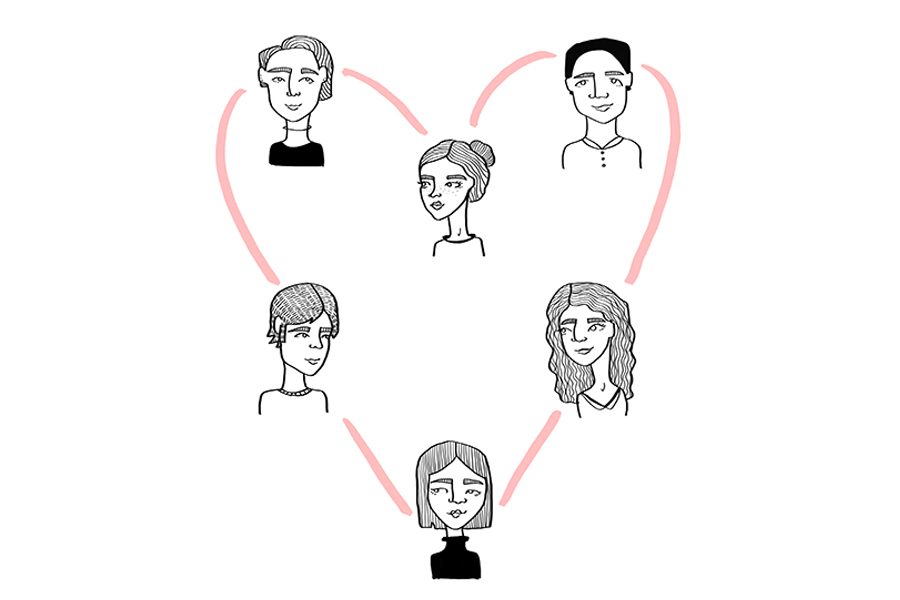Polyamory is a valid form of love
I’ve been openly polyamorous for a little more than two years, but I have known, in some part of myself, for longer. As a teenager, the idea of being attached to one person made marriage and family life unattractive to me. I struggled with long-term relationships and the associated feeling of being trapped. The idea of people feeling possessive of me made my stomach turn and, though I saw a healthy monogamous model in my parents, I felt that any long-term relationship I would enter would be doomed to fail.
When I discovered polyamory, something clicked. There was a clear, healthy approach to relationships that made sense, something that I felt I could practice.
Polyamory is defined as the “nonpossessive, honest, responsible and ethical philosophy and practice of loving multiple people simultaneously.” It requires open and clear communication, plenty of honesty and an approach to romantic relationships that does not involve exploitation. Any romantic or sexual practice rooted in deceit or manipulation is inherently not polyamorous in nature. Open relationships, as practiced by some, are not necessarily polyamorous.
Some people are poly and others are not. It is the same as being gay, straight, transgender or cisgender. It is a fundamental part of who you are and how you approach relationships. One is not better than the other, but a monogamous person in a poly relationship would likely feel very unhappy and vice versa.
I’ve explained what it means to be poly to many people. To some, it makes a lot of sense, and they respond excitedly. To others, it seems to be an absurd concept, one that they could never practice in their day-to-day lives. I’m often asked about jealousy or how I can expect a poly relationship to last. How do I know my partner isn’t going to find someone they like better? How do I have the time to date multiple people fully?
Everyone practices polyamory differently. For some, jealousy is an issue. Some have one primary partner and hook up with random people, others have multiple long-term partners and cringe at the idea of casual sex. In my life, being poly has allowed my fiance to have an active dating life and me to have alone time — she’s incredibly extroverted, but people stress me out. It also lets me interact with interesting and attractive people without fearing that I’ll somehow betray my partner.
Initially, jealousy was an issue for me, but working through it was an incredibly freeing experience that enriched all of my relationships, both romantic and platonic. Regardless of orientation, I believe jealousy and possessiveness are incredibly toxic emotions.
One day, I hope to have a beautiful, multi-partnered household. I look forward to the idea of raising children with more than two parents, a practice which is not inherently harmful to childhood development. It allows for the pooling of resources, attention and support for each child. As someone who has always been a little terrified of parenthood, the idea of having multiple partners to do it with is incredibly reassuring.
If I had lived in a different time, information on polyamory would have likely been unavailable to me. I likely would have entered a long-term monogamous relationship and been deeply unsatisfied. I truly believe that many marriages end in divorce because one or both individuals are poly, especially when cheating is involved. For those who have ever questioned their ability to be in a functional romantic relationship, consider whether or not you are truly monogamous. Regardless of the outcome, it’ll give you a more comprehensive view of how relationships can work.
Leave a Comment
Your donation will support the student journalists of Tulane University. Your contribution will allow us to purchase equipment and cover our annual website hosting costs.




Joel • Feb 9, 2017 at 1:14 pm
Thanks for sharing! 🙂 I worry about you saying that jealousy is toxic. It is a normal reaction to some situations for some people. What is toxic is how some behave when they have jealous feelings. Blaming, abuse, divorce, and even murder are terrible choices. Introspection, asking for help, and distraction are more the ways poly folk like to do it.
Kathryne LeBell • Feb 15, 2017 at 5:46 pm
I appreciate your comment! That is a good point and definitely what I intended to say, though the phrasing wasn’t clear.